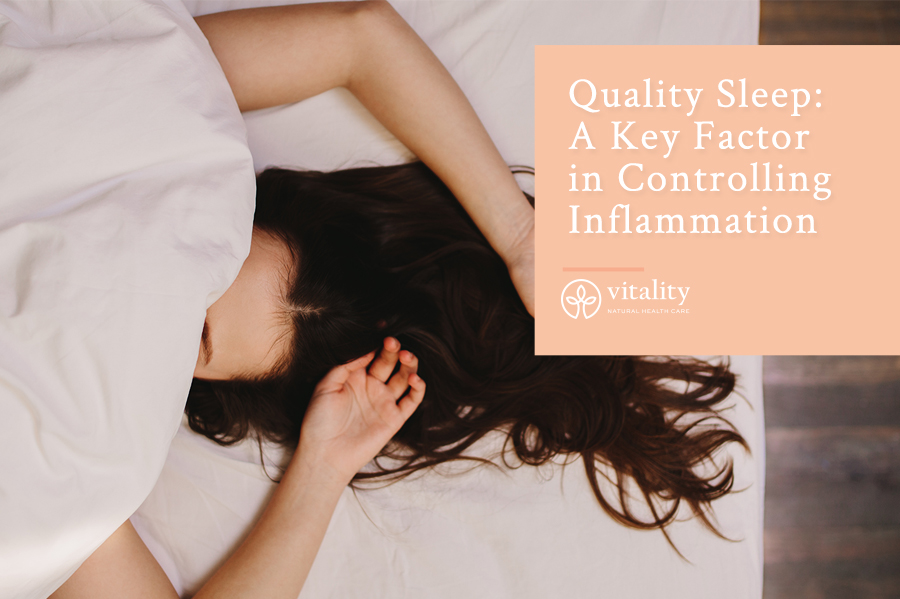Sleep.
It’s a topic that often gets left out of many medical conversations, but one that I want to address as part of this month’s four-part series on inflammation. I think it’s an important topic to discuss since as a naturopath, many of the treatment plans I create for patients include lifestyle recommendations for things like movement and exercise, stress management, and sleep hygiene.
It’s also important because science is now discovering that individuals who lack quality sleep – sleeping too much, sleeping too little, or sleeping at times outside of the body’s natural rest cycle – tend to have higher levels of inflammation and are more prone to developing inflammatory diseases (1, 2).
In my opinion, getting quality sleep is one of the most important lifestyle components to address when it comes to inflammation and disease.
Understanding Sleep
Your circadian rhythm, also known as your sleep/wake cycle, is an internal system that is designed to regulate your feelings of wakefulness and sleepiness.
It is controlled by the area of the brain that responds to light, the suprachiasmatic nucleus. This is why most of us are alert when the sun is shining and experience tiredness or fatigue once the sun goes down.
In addition to regulating sleep and wake patterns, our circadian rhythm also plays a role in immune system function. When you go to sleep at night, your immune system works hard to repair and heal any parts of your body that need to be tended to.
It also controls and manages the inflammation in our bodies. If you’re not getting quality sleep, you’re altering your circadian rhythms and ultimately, limiting your body’s ability to fight inflammation and disease, putting you at risk of weight gain, metabolic disease, heart disease, and cancer.
This is something I see frequently in patients who work unconventional hours, like night nurses who often work overnight. Their levels of internal inflammation tend to be higher than individuals who work during daytime hours.
Unusual sleep times cause inflammatory markers, like interleukin 6, tumor necrosis alpha, and c-reactive protein, to be elevated.
How to Get Quality Sleep
Understanding your body’s circadian rhythm, or internal clock is the first step to better sleep.
We live in a time where people are staying up later working, watching television, or scrolling on their phones. We’re also eating later in the day because we’re staying up late – both of these factors can adversely affect our sleep.
In order to honor your circadian rhythm, it’s best to wake with the sun and begin winding down when the sun goes down.
In an ideal world, we would all get 7-9 hours of quality sleep, and have at least two hours to wind down and decompress before heading to bed.
Keep in mind, however, that too much of a good thing is…well, too much.
Research has shown that excessive amounts of sleep, 10 hours or more, can contribute to inflammation in the same way that too little sleep can contribute to inflammation (3).
Aim for 7-9 hours each night and you’ll be golden!
Here’s how to make that happen:
- Set the intention to make quality sleep a priority – this is a must and will help you stay on track.
- Decide on a bedtime that will allow you to get 7-9 hours of sleep each night, and make a commitment to be in bed by that time.
- Avoid caffeine after 2pm and try to have dinner 3-4 hours before bedtime.
- Two hours before bedtime, reduce your exposure to electromagnetic frequencies by turning off all electronic devices.
- Take time to decompress and let go of negative emotions before getting into bed – journaling, meditation, deep breathing, and light stretching are great ways to do this.
Taking these steps will help to invite more calm, yin energy into your life, so you can fall asleep with ease and stay asleep, instead of waking up in the middle of the night with racing thoughts and feelings of stress and anxiety.
As I mentioned in the last blog article on hormones and inflammation, stress causes our bodies to secrete cortisol, which can contribute to inflammation. Managing stress will help you to have quality sleep and will also help to reduce inflammation.
What to do if you can’t sleep
If you’re having trouble sleeping after incorporating the suggestions mentioned earlier in this blog article, it’s a good idea to get your hormones checked – especially if you are a woman.
Progesterone is a hormone that helps us to relax and calm down at night. If you are lacking in progesterone, you may have difficulty going to sleep and staying asleep.
In addition to getting tested, you can also try supplementation. A few of the supplements I recommend to promote quality sleep are:
- GABA
- Kavinace
- Melatonin
- Cortisol Balancer
Each of these supplements is unique and I recommend them for different reasons, after checking my patients’ lab work. Consult with your health care professional to see if these are a good option for you.
Getting quality sleep is a must when it comes to reducing inflammation and supporting your health, even for me as a doctor.
On nights that I am unable to get enough sleep or get quality sleep, I definitely feel it the next day. I also experience weight gain and digestive disruptions.
I’ve learned from experience that the best way to get my body back on track is to follow the suggestions I’ve given you here in this log article and do my best to get to bed at a reasonable hour.
I trust that you’ll have the same results if you put these lifestyle recommendations into action.
xo,


